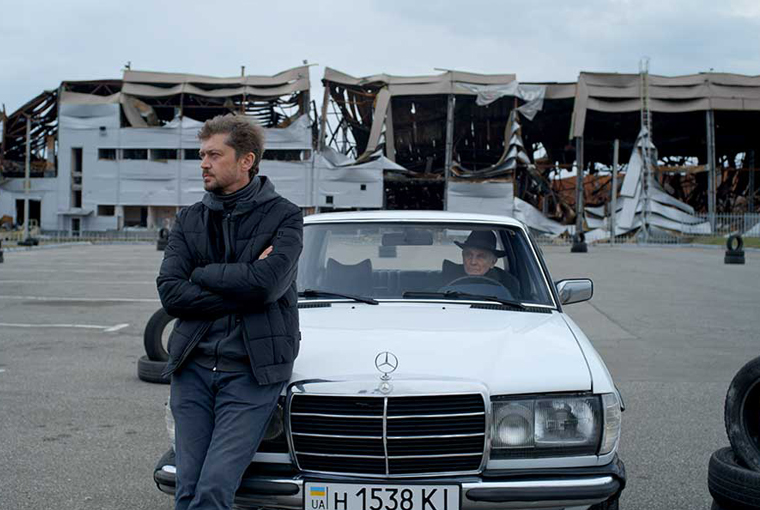Stories From a Men’s Isle
Valentyn Vasyanovych’s To the Victory! (Za peremohu!, 2025)
Vol. 159 (November 2025) by Antonis Lagarias
Since 2022, Ukrainian filmmakers have responded to the Russian full-scale invasion by risking their lives to document the reality of the war firsthand, and by telling its stories through fiction. The latter tend to focus on familiar themes related to warfare, such as the experiences of soldiers, the displacement of civilians, the fate of children, and the change in gender dynamics compared to peacetime.1 Narratives that envision a post-war future for Ukraine are rare. With a ceasefire being on the table in the past few years, speculations about the possible terms for an end of fighting and the compromises this may imply for Ukraine have turned into burning political questions. Filmmaker Valentyn Vasyanovych tackles this issue from a different angle with his latest film To the Victory!, in which he depicts how life in Kyiv might look after the war without ever mentioning how it ended.
In the film, Kyiv is a city emptied of women. According to the narrative, the war has lasted for many years and while men have slowly resumed their work after serving in the army, their displaced families have created new lives for themselves abroad and seem hesitant to return. As a result, the male characters appear uncertain about their role in post-war society. This idea comes from real-life statistics. Until very recently, Ukraine’s borders were closed to men between 18 and 60 years regardless of their conscription status.2 Of the roughly five million Ukrainian refugees recorded in Europe today, the vast majority are women and children. While the war goes on, the film suggests, life continues for these displaced people who may find that Ukraine’s post-war economy has little to offer. Even if the war ended with Kyiv remaining an unoccupied city, there is no easy return to ‘normality’ for its residents.
The film centers on a group of men who are all around fifty years old and plan to shoot a film. Vasyanovych plays the main character himself, a director struggling to understand what kinds of stories can be told after the war. With his friends and son, they try different scripts and settings, joke about their own situation, share stories about their families, and mock the international film funding structures that demand from them yet more stories about war and trauma. In fact, in this imagined post-war life, memories of the war and the Russians appear less as traumas and more as practical nuisances. For instance, an abandoned mine explodes during a shoot, forcing them to stop. The sniper-proof protection covering the windows takes Vasyanovych hours to remove, time he could have spent working on his film. Gradually, it becomes clear that the characters are confronted with a choice: since the women will not return, should the men join them abroad or stay and attempt to piece their homeland back together?
This setting may sound somewhat didactic, yet the film does not take itself too seriously, which makes the viewing experience oddly entertaining. It avoids accusing the absent wives of any kind of national betrayal, which one might have expected, and instead is content to celebrate friendship, a perhaps romanticized take on brotherhood that feels honest nonetheless. Vasyanovych depicts, with humor, a widespread sense of impotence in the face of the realization that victory, even if it comes, will not arrive with triumph and glory, but will instead be followed by a deep existential crisis. Such feelings drive the film’s fictional director to constantly revise the narrative of his script. He repeats familiar formulas, adds beautiful landscape shots from Kyiv’s rooftops, imagines fight and sex scenes – all images that international festivals expect, as he claims – yet nothing seems to work. However, what seems to matter most is to try and preserve one’s identity as a storyteller. Meanwhile, his son appears ready to take control of his own future through his studies and work experience. In the two characters, the film finds its response to the question of how one might regain a sense of agency within a society that is both physically and emotionally scarred.
To the Victory! ultimately asks who will be in a position to write a society’s stories after such a devastating event as war. Will they come from the people, from forces abroad, or the state? Post-war narratives often seek to rebuild a sense of social cohesion through national identity, shaping images of pain, glory, and collective struggle. In contrast, anti-war stories may depict people’s indifference to national aspirations and their concern for themes of daily life, such as love, family, and friendship. In extreme cases, the future of a place at war lies in the hands of the very architects of its destruction, as in the case of Gaza today, where it remains uncertain whether Gazans will have a say in writing its future. In the context of these debates, To the Victory! is not necessarily opposed to Ukraine’s national narrative as one could argue that it makes a case for a quiet kind of patriotism. Yet the film’s personal and bittersweet tone aligns more with what may concern the people rather than the state. In doing so, it turns away from grand narratives of collective struggle to convey instead one of the many small-scale, individual stories that, when brought together, may shed light on the collective hopes and fears Ukrainians hold about their future.
- See for instance Dmytro Moiseiev’s Grey Bees (2024) or Maryna Er Gorbach Klondike (2022). ↩︎
- Watson, K. (2025, September 9). A new law lets some Ukrainian men leave the country. But will it hurt the war effort? BBC News. https://www.bbc.com/news/articles/czx05gp51qlo ↩︎

Leave a Comment